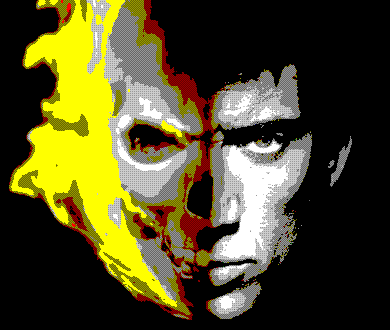Between Two Worlds
"I'm the only one who can
walk in both worlds.
I'm T. S. Eliot."
walk in both worlds.
I'm T. S. Eliot."
| I caught the sudden look of some dead master Whom I had known, forgotten, half recalled Both one and many; in the brown baked features The eyes of a familiar compound ghost Both intimate and unidentifiable. So I assumed a double part, and cried And heard another's voice cry: 'What! are you here?' Although we were not. I was still the same, Knowing myself yet being someone other— And he a face still forming; yet the words sufficed To compel the recognition they preceded. And so, compliant to the common wind, Too strange to each other for misunderstanding, In concord at this intersection time Of meeting nowhere, no before and after, We trod the pavement in a dead patrol. I said: 'The wonder that I feel is easy, Yet ease is cause of wonder. Therefore speak: I may not comprehend, may not remember.' And he: 'I am not eager to rehearse My thoughts and theory which you have forgotten. These things have served their purpose: let them be. So with your own, and pray they be forgiven By others, as I pray you to forgive Both bad and good. Last season's fruit is eaten And the fullfed beast shall kick the empty pail. For last year's words belong to last year's language And next year's words await another voice. But, as the passage now presents no hindrance To the spirit unappeased and peregrine Between two worlds become much like each other, So I find words I never thought to speak In streets I never thought I should revisit When I left my body on a distant shore. Since our concern was speech, and speech impelled us To purify the dialect of the tribe And urge the mind to aftersight and foresight, Let me disclose the gifts reserved for age To set a crown upon your lifetime's effort. First, the cold friction of expiring sense Without enchantment, offering no promise But bitter tastelessness of shadow fruit As body and soul begin to fall asunder. Second, the conscious impotence of rage At human folly, and the laceration Of laughter at what ceases to amuse. And last, the rending pain of re-enactment Of all that you have done, and been; the shame Of motives late revealed, and the awareness Of things ill done and done to others' harm Which once you took for exercise of virtue. Then fools' approval stings, and honour stains. From wrong to wrong the exasperated spirit Proceeds, unless restored by that refining fire Where you must move in measure, like a dancer.'
|
